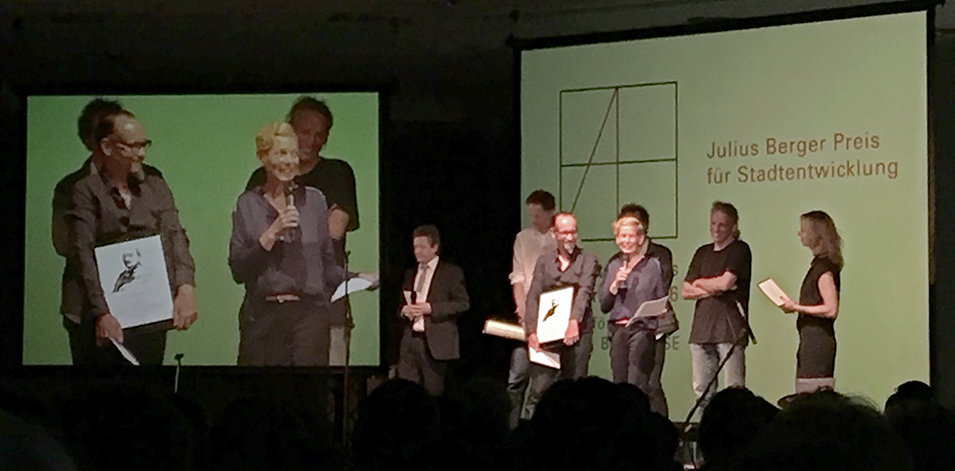ExRotaprint was awarded the 2016 Julius Berger Prize for Urban Development.
On June 3, 2016, the Julius Berger Prize for Urban Development, given out every three years, was awarded in conjunction with the 2016 Berlin Architecture Prizes, presided over by Andreas Geisel, Senator for Urban Development and Environment. It gives us great pleasure that the jury, under the patronage of Berlin’s honorary citizen Edzard Reuter, has decided to honor our project ExRotaprint with this award. The Julius Berger Prize for Urban Development was sponsored by Bilfinger SE to commemorate the Berlin entrepreneur Julius Berger and is endowed with 10,000 euros. The prize was awarded for the first time in 2013 for the Arnold Fortuin Haus, a housing project in Berlin-Neukölln for Sinti and Roma, an initiative of the Aachener Siedlungs- und Wohnungsgesellschaft.
We are especially pleased that a tenant-based project such as ExRotaprint, which presents an alternative to property speculation and is committed to the formation of a heterogeneous urban community, is awarded such a prize. We therefore hope that Berlin’s urban development policy will focus more attention and support on community-oriented projects that operate independent of financial profit and are open to all community groups. Access to land and affordable housing for all is the basis for a social, heterogeneous urban society without exclusion.
Acceptance Speech by Daniela Brahm and Les Schliesser
On the occasion of the award presentation for the 2016 Julius Berger Prize for Urban Development to ExRotaprint on June 3, 2016 within the framework of the Architecture Prize 2016, Palais am Funkturm, Berlin
“It’s always a pleasure when you win something—my sister-in-law called me recently because my brother won a trip to Turkey. But my brother had passed away, and the prize contest was also from three years earlier. In the end it turned out that the whole thing was an advertising promotion, and everyone who had filled out the prize contest won sooner or later.
This here is, of course, an entirely different story. We did not fill anything out and we were still nominated, which is now for us really a great pleasure—now we are standing here and are being awarded a prize for urban development from Bilfinger SE—we, a tenants’ project that has taken up the cause against property speculation, without financial profit and in order to demonstrate that it is possible to create a model for a different kind of urban development based on a heterogeneous utilization of real estate.
Nearly fourteen years ago, when we started working on ExRotaprint, its success was completely unlikely—the only thing that played to our advantage was a decimated real estate market and the fact that the Liegenschaftsfonds Berlin wanted to sell the site in Wedding at exactly the same time. We took advantage of this ground zero in the market in order to establish a project that excludes financial profits through ownership and shifts the focus instead to how the property is used and its potential social capital.
Today, the financial crisis has catapulted us into another orbit. “Concrete gold” can also be mined in Wedding; the times of ground zero are over in Berlin. It is therefore all the more important for society that politics actively stands for a different, non-exclusive form of urban development and promotes projects that deal with diverse and also marginalized groups, so that everyone is a winner at future major awards honoring Berlin’s urban development.
We, as the initiators of ExRotaprint, also have a number of people to thank who stood together with us during the project: In the first year and a half this was Karin Baumert, the former city councilwoman who provided the initial boost with her contacts in politics; Georg Löchner, who was still an architecture student at the time; Rainer Giedat, who won a prize for real estate management with his master thesis on the former Rotaprint site, which included parts of our concept, and who was then hired by the Liegenschaftsfonds. Christian Schöningh and Bernhard Hummel who maneuvered with us through the takeover phase and planned together with us the first construction measures; we would like to thank Bernhard Hummel and Oliver Clemens, who as planning architects still help us manage the project with an eye on costs. From the world of politics, Ralf Wieland, Ephraim Gothe, Christian Hanke, and Thomas Flierl who advocated for our project. Ephraim Gothe in particular is an indispensable figure in Berlin’s urban development scene, serving as an intermediary between civil society, politics, and the Senate. We would like to thank the partners of ExRotaprint for their trust and close, goal-oriented cooperation; and, of course, our partners Rolf Novy-Huy from the Stiftung trias and Christoph Langscheid from the Stiftung Edith Maryon—the heritable building right we formed with the two foundations is an important building block of our concept in order to remove the site from property speculation over the longterm and prevent its resale—heritable building right is an instrument that the city can also make greater use of in order to safeguard the goals of projects for an extended number of years. Last but not least, we would like to thank all ExRotaprint tenants—a group we are also part of—for the cohesion and regular rental income they’ve provided as the economic basis for the ExRotaprint project. Thanks again for the prize, we are very happy with it.”





